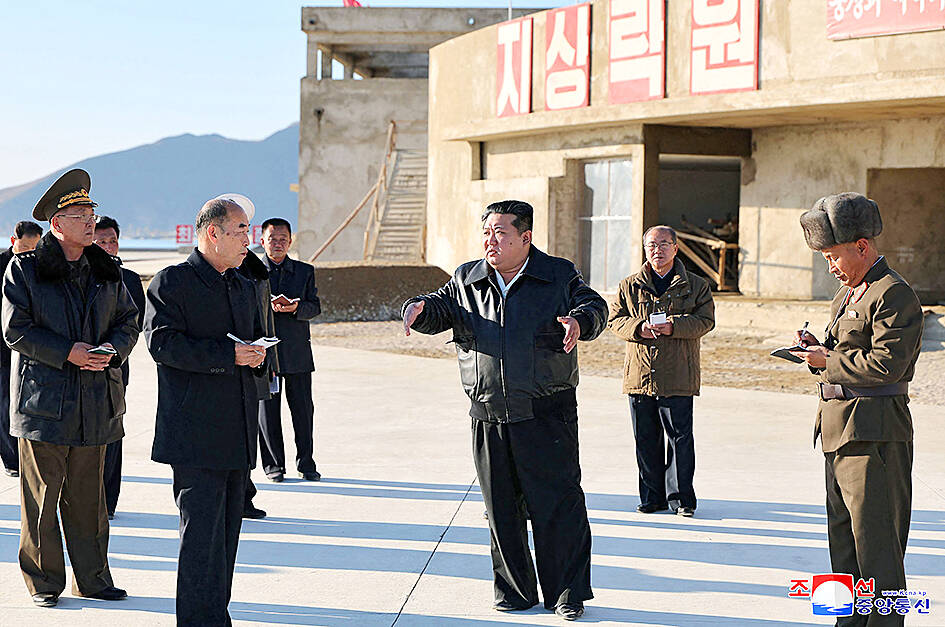Gunshots, screams, eerie laughter: South Korea’s border island Ganghwa is being bombarded nightly with blood-curdling sounds, part of a new campaign by the nuclear-armed North that is driving residents to despair.
Before it started, 56-year-old Kim Yun-suk fell asleep to the hum of insects and woke to the chirping of birds. Now, she is kept awake every night by what sounds like the soundtrack of a low-budget horror movie at top volume.
“The peaceful sounds of nature... have now been drowned out,” Kim said.

Photo: AFP
“All we hear is this noise.”
The campaign is the latest manifestation of steadily declining ties between the two Koreas this year, which have also seen Pyongyang test ever more powerful missiles and bombard the South with trash-carrying balloons.
Since July, North Korea has been broadcasting the noises for huge chunks of almost every day from loudspeakers along the border.
The northern point of Ganghwa — an island in the Han river estuary on the Yellow Sea — is only about two kilometers from the North.
The nighttime broadcast includes what sounded like the screams of people dying on the battlefield, the crack of gunfire, bombs exploding, along with chilling music that starts at 11pm.
In the almost pitch-black fields, sinister noises echoed as the stars in the clear night sky shone beautifully alongside the coastal road lights, creating a stark and unsettling contrast.
North Korea has done propaganda broadcasts before, said 66-year-old villager Ahn Hyo-cheol, but they used to focus on criticizing the South’s leaders, or idealizing the North.
Now “there are sounds like a wolf howling, and ghostly sounds,” he said. “It feels unpleasant and gives me chills. It really feels bizarre.”
Ganghwa county councilor Park Heung-yeol said the new broadcasts were “not just regime propaganda — it’s genuinely intended to torment people.”
TORTURE
Experts said the new broadcasts almost meet the criteria for a torture campaign.
“Almost every regime has used noise torture and sleep deprivation,” said Rory Cox, a historian at the University of St Andrews.
“It is very common and leaves no physical scarring, therefore making it deniable.”
Exposure to noise levels above 60 decibels at night increases the risk of sleep disorders, experts said. Levels of up to 80 decibels late at night on Ganghwa have been recorded.
“I find myself taking headache medicine almost all the time,” said An Mi-hee, 37, adding that prolonged sleep deprivation due to the noise has also led to anxiety, eye pain, facial tremors and drowsiness.
“Our kids can’t sleep either, so they’ve developed mouth sores and are dozing off at school.”
Distraught and desperate, An traveled to Seoul and got on her knees to beg lawmakers at the National Assembly to find a solution, breaking down in tears as she described the island’s suffering.
“It would actually be better if there were a flood, a fire or even an earthquake, because those events have a clear recovery timeline,” An said.
“We have no idea if this will go on until the person in North Korea who gives the orders dies, or if it could be cut off at any moment. We just don’t know.”
‘HORROR FLICK’
The noise tormenting Ganghwa island residents appeared to be a rudimentary mix of clips from a sound library, typically common at any TV or radio broadcasters, audio experts said. The sound effects are “like something found in a South Korean horror film in the 70s and 80s,” said sound engineer Hwang Kwon-ik.
The two Koreas remain technically at war since the 1950 to 1953 conflict ended in an armistice not a peace treaty.
North Korean leader Kim Jong Un this year declared Seoul his “principal enemy” and has ramped up weapons testing and built closer military ties with Russia.
The isolated and impoverished North is known to be extremely sensitive about its citizens gaining access to South Korean pop culture. Some experts have suggested the latest broadcasts could be aimed at preventing North Korean soldiers from hearing the South’s own propaganda broadcasts, which typically feature K-pop songs and international news.
In August, just weeks after South Korea resumed K-pop broadcasts in response to Pyongyang floating trash-carrying balloons south, a North Korean soldier defected by crossing the heavily fortified border on foot.
But Lee Su-yong, an audio production professor at the Dong-Ah Institute of Media and Arts, said: “If there is sound coming towards the North that you want to mask, then the sound (you use to cover it) must also be directed toward the North.”
“It seems less about masking noise and more about inflicting pain on people in the South,” he said.
Choi Hyoung-chan, a 60-year-old resident, said the South Korean government had failed to protect vulnerable civilians on the frontier.
“They should come here and try to live with these sounds for just 10 days,” he said, referring to officials in Seoul.
“I doubt they could even endure a single day.”

Taiwan doesn’t have a lot of railways, but its network has plenty of history. The government-owned entity that last year became the Taiwan Railway Corp (TRC) has been operating trains since 1891. During the 1895-1945 period of Japanese rule, the colonial government made huge investments in rail infrastructure. The northern port city of Keelung was connected to Kaohsiung in the south. New lines appeared in Pingtung, Yilan and the Hualien-Taitung region. Railway enthusiasts exploring Taiwan will find plenty to amuse themselves. Taipei will soon gain its second rail-themed museum. Elsewhere there’s a number of endearing branch lines and rolling-stock collections, some

The Democratic Progressive Party (DPP), Chinese Nationalist Party (KMT), and the country’s other political groups dare not offend religious groups, says Chen Lih-ming (陳立民), founder of the Taiwan Anti-Religion Alliance (台灣反宗教者聯盟). “It’s the same in other democracies, of course, but because political struggles in Taiwan are extraordinarily fierce, you’ll see candidates visiting several temples each day ahead of elections. That adds impetus to religion here,” says the retired college lecturer. In Japan’s most recent election, the Liberal Democratic Party lost many votes because of its ties to the Unification Church (“the Moonies”). Chen contrasts the progress made by anti-religion movements in

Could Taiwan’s democracy be at risk? There is a lot of apocalyptic commentary right now suggesting that this is the case, but it is always a conspiracy by the other guys — our side is firmly on the side of protecting democracy and always has been, unlike them! The situation is nowhere near that bleak — yet. The concern is that the power struggle between the opposition Chinese Nationalist Party (KMT) and their now effectively pan-blue allies the Taiwan People’s Party (TPP) and the ruling Democratic Progressive Party (DPP) intensifies to the point where democratic functions start to break down. Both

This was not supposed to be an election year. The local media is billing it as the “2025 great recall era” (2025大罷免時代) or the “2025 great recall wave” (2025大罷免潮), with many now just shortening it to “great recall.” As of this writing the number of campaigns that have submitted the requisite one percent of eligible voters signatures in legislative districts is 51 — 35 targeting Chinese Nationalist Party (KMT) caucus lawmakers and 16 targeting Democratic Progressive Party (DPP) lawmakers. The pan-green side has more as they started earlier. Many recall campaigns are billing themselves as “Winter Bluebirds” after the “Bluebird Action”